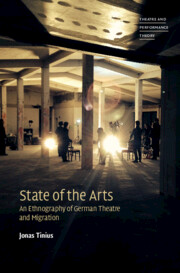Book contents
- State of the Arts
- Theatre and Performance Theory
- State of the Arts
- Copyright page
- Dedication
- Contents
- Figures
- Acknowledgements
- Note on the Text
- Introduction
- Chapter 1 Activism, Aesthetic Education, and the Making of Modern German Theatre
- Chapter 2 A Public Migrant Theatre
- Chapter 3 Rehearsal as Method
- Chapter 4 Repertoire Politics
- Chapter 5 Places along the Ruhr
- Conclusion
- References
- Index
Chapter 1 - Activism, Aesthetic Education, and the Making of Modern German Theatre
Published online by Cambridge University Press: 03 August 2023
- State of the Arts
- Theatre and Performance Theory
- State of the Arts
- Copyright page
- Dedication
- Contents
- Figures
- Acknowledgements
- Note on the Text
- Introduction
- Chapter 1 Activism, Aesthetic Education, and the Making of Modern German Theatre
- Chapter 2 A Public Migrant Theatre
- Chapter 3 Rehearsal as Method
- Chapter 4 Repertoire Politics
- Chapter 5 Places along the Ruhr
- Conclusion
- References
- Index
Summary
Chapter 1 unfolds the historical context of two central overarching notions in this book’s narrative: the German Kulturstaat and the country’s Bildungsbürgertum. Combining historical analysis with ethnographic fieldwork in Berlin during the fiftieth-anniversary edition of Germany’s largest theatre festival and observations at the city’s iconic Volksbühne, this chapter explores the moral significance attributed to institutionalised public theatres, as well as activist contestations of its state patronage and institutional structures. It also traces the role of cultural politics in facilitating the emergence of public theatres as sites for aesthetic self-cultivation (Bildung) and nation-building in the face of an increasingly diverse contemporary Germany. Expanding on the notion of institutions as traditions in Western contexts, it expands on the necessity for anthropology to take into account cultural history and art history as part of fieldwork.
- Type
- Chapter
- Information
- State of the ArtsAn Ethnography of German Theatre and Migration, pp. 31 - 67Publisher: Cambridge University PressPrint publication year: 2023

